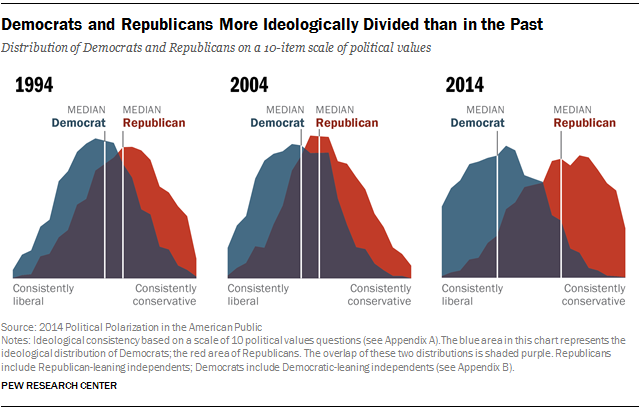I want to know about the fact that certain positions seem to be tied to ideology which is in turn tied to partisanship. For example, the issue of gun control. Supporting gun control is strongly tied with being a liberal Democrat and opposing it is tied with being a conservative Republican. I have noticed that with websites and how positions fall ideologically. Is the fact that certain positions are proxies for other positions on issues that may not be related a new phenomenon?
Is the idea of positions on one issue showing the likely position on another issue a new phenomenon?
-
2The 2 party system of the US has forced position bundling for a long time. Polarization might be cutting down on issue heterogeneity. A highly demographically targeted news medium might be raising awareness of once unconsidered positions as well. I do think there's a recent greater awareness of many issues and most also seem to know what side they "should" be on. This could be because political identity is stronger than it used to be, replacing concepts like trades, origin, and religion as the measure of man. None of this is new, but it could be strengthening.– dandavisCommented Jul 27, 2020 at 16:30
-
3I suspect there are two explanations. One is an age of hyperpartisanship, where people support (or oppose) an idea simply because of who opposes (or supports) it. Another is that a great many questions are not actually independent. Much can be characterized as "freedom from" vs. "freedom to" -- do you believe that man is an individual being, and others should leave him alone, or do you believe that man is a social being, only able to prosper in the community with others?– o.m.Commented Jul 27, 2020 at 16:31
-
2I swear you've asked questions before (and that your account was more than three days old).– F1KrazyCommented Jul 27, 2020 at 16:58
-
I think this is a good question and am interested to know the reason for downvote(s) and close votes, beside the suspicion that this has been asked before. Coalition building explains the need for this phenomenon in a two-part system and there are various reasons why it seems moreso in say the House of Representatives than in the past (whither the blue dogs and the liberal Republicans?). Really the question should be does the common but involved person display this more than in the past?– DamilaCommented Jul 27, 2020 at 17:35
1 Answer
If I understand the question correctly, it is about ideological coherence or consitency. The more ideologically coherent the base of a party is, the more thoroughly its followers will agree on a list of ideological issues. Issues like gun control and, say, abortion or deficits are superficially unrelated but ideologically connected. On the one hand, the party system has always implied a degree of ideological coherence. However, yes, this has been increasing for some time due to partisan polarization. Here's a helpful bit from Pew Center on this.
